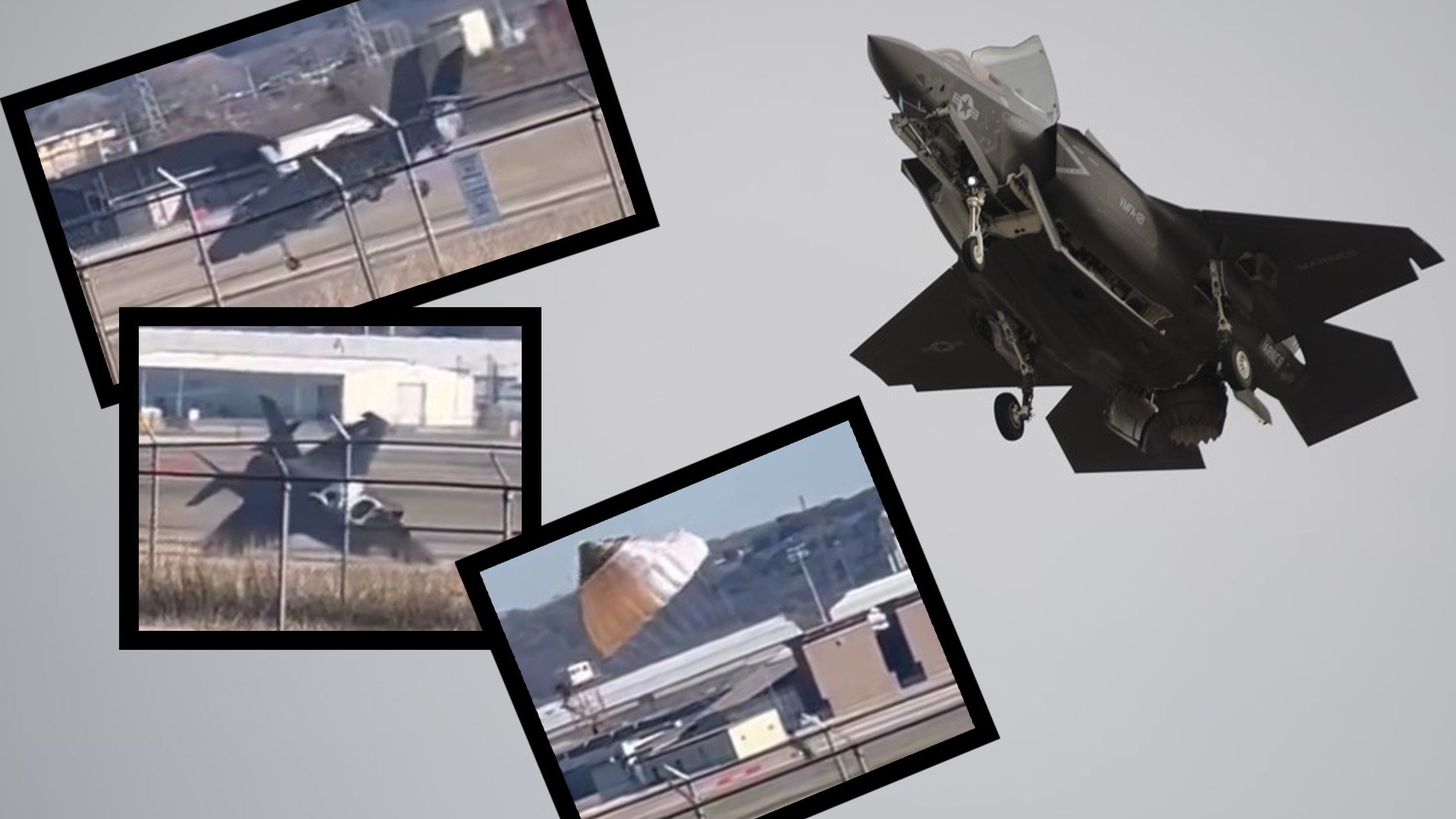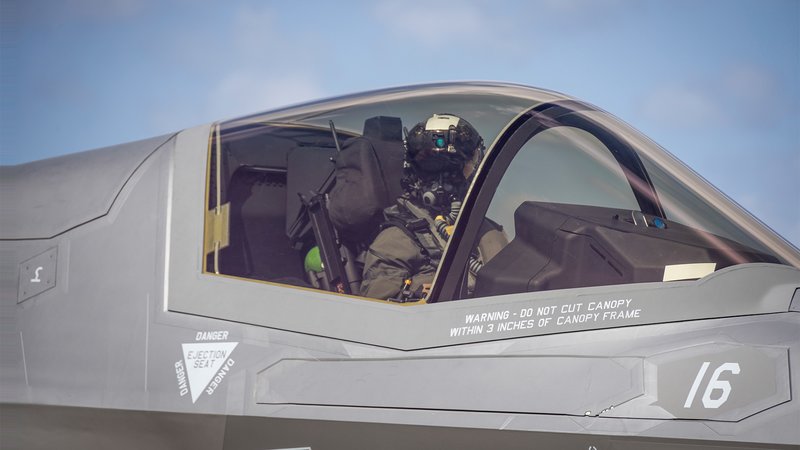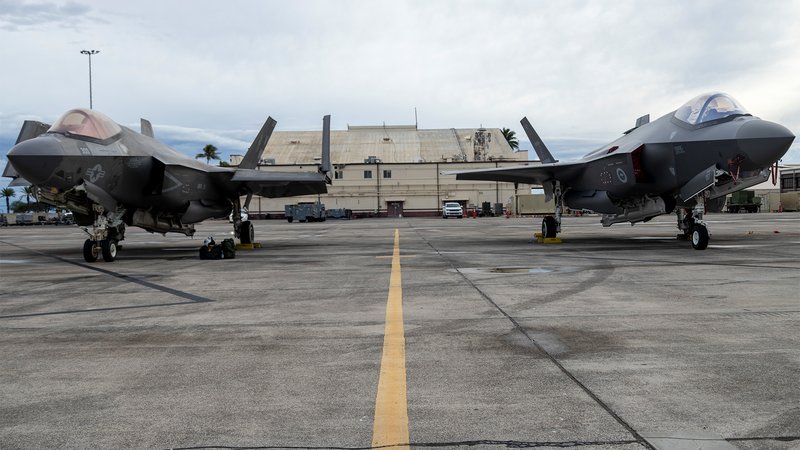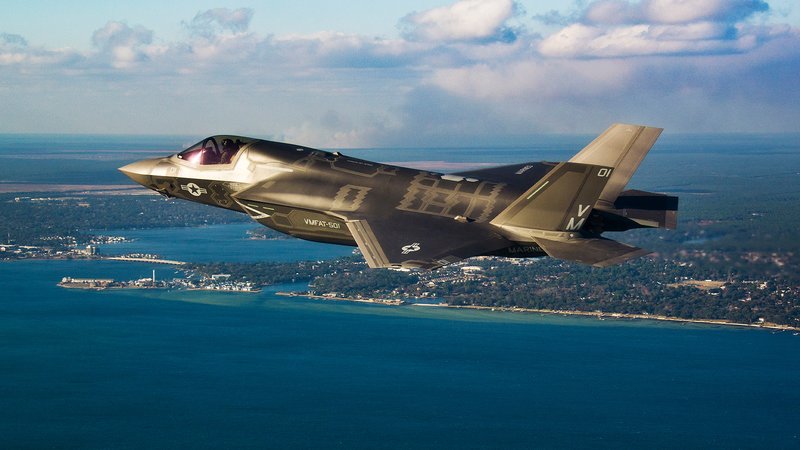Feds: Pilot of Crashed F-35B Fighter in Texas Was US Air Force Major

The F-35B Lightning II Joint Strike Fighter that crashed around 10:15 a.m. on Dec. 15, 2022, at Naval Air Station Joint Reserve Base Fort Worth in Texas was undergoing the acceptance process, part of its transfer from manufacturer Lockheed Martin to the US Marine Corps. Composite by Coffee or Die Magazine.
The pilot who ejected from an F-35B Lightning II Joint Strike Fighter that crashed during a vertical landing in Texas was a US Air Force major on loan to the Defense Contract Management Agency.
DCMA spokesperson Matthew Moore told Coffee or Die Magazine that the Thursday, Dec. 15, mishap at Naval Air Station Joint Reserve Base in Fort Worth occurred while the pilot was testing the fighter, part of the acceptance process to turning it over to the US Marine Corps.
But then it gets a little complicated. The unnamed pilot was under DCMA until late October, when he got orders to an unidentified Air Force command.
Moore said that the career Air Force pilot was then loaned back to DCMA occasionally to run acceptance flights.

A US Marine Corps F-35B Lightning II Joint Strike Fighter assigned to the "Bats" of Marine Fighter Attack Squadron 242 is refueled at the fuel pits at Ie Shima Okinawa, Japan, Oct. 24, 2022. US Marine Corps photo by Pfc. Justin J. Marty.
Lockheed Martin spokesperson Jacqueline Lorenzetti confirmed to Coffee or Die that bystander footage taken of the crash circulating on social media appears to be authentic.
It lasts 37 seconds. The first 14 seconds show the Joint Strike Fighter descending from roughly three stories toward the tarmac before it hops. Then the jet’s nose careens into the flightline, scraping the pavement for another few seconds while slowly rotating.
About 26 seconds into the reel, the pilot ejects from the cockpit. The parachute pops, and then he hits the ground hard.
“After the crash, he was taken to the hospital as a preventive measure,” Moore said, adding that the pilot sustained no serious injuries and was quickly released.

There are three types of F-35 Lightning II Joint Strike Fighters: F-35A, F-35B, and F-35C. Here, an F-35C from the "Black Knights" of Marine Fighter Attack Squadron 314 sits beside an F-35A from Number 3 Squadron Royal Australian Air Force at Joint Base Pearl Harbor-Hickam, Hawaii, Nov. 28, 2022. US Marine Corps photo by Cpl. Levi Voss.
The F-35B that crashed in Texas was built for the Marine Corps.
It’s designed to operate from amphibious ships and austere operating bases. That’s why it’s capable of short-distance takeoffs and vertical landings, like the one the US Air Force pilot was trying to perform.
Because the F-35B was undergoing acceptance trials, it still belongs to Lockheed Martin. Lorenzetti told Coffee or Die the crash will be investigated by Naval Air Systems Command, better known as NAVAIR.
NAVAIR spokesperson Amy Behrman confirmed her agency would be probing the mishap, but told Coffee or Die that the damaged aircraft has “not yet been transferred into US government custody.”
Officials at Lockheed Martin, DCMA, and the F-35 Joint Program Office said a damage assessment hasn’t been completed, but the strike fighters aren’t cheap.
The flyaway cost of an F-35B with new Block 4 software tops $100 million.

The Pentagon's first production F-35B Lightning II Joint Strike Fighter soars over Destin, Florida, on Jan. 11, 2011. It was on its way to its new home at Eglin Air Force Base. This F-35B belonged to the "Warlords" of Marine Fighter Attack Squadron 501, a training unit. US Air Force photo by Staff Sgt. Joely Santiago.
With an estimated $1.7 trillion price tag, the F-35 Lightning II Joint Strike Fighter program remains the Department of Defense’s most expensive weapon system program.
Lockheed Martin has delivered more than 700 of the stealth planes to the Air Force, Navy, and Marine Corps.
Despite delays, technological glitches, and cost overruns, the three services intend to buy and fly 2,470 F-35s during the program’s 66-year life cycle.
Although critics point to the program's ballooning budget and the many gremlins that have attacked the high-tech project, Pentagon planners insist the F-35 remains the most lethal and survivable fighter ever built.
Read Next: US Navy’s Fleet Oiler John Lewis Steams to Sinking Sailboat

Carl Prine is a former senior editor at Coffee or Die Magazine. He has worked at Navy Times, The San Diego Union-Tribune, and Pittsburgh Tribune-Review. He served in the Marine Corps and the Pennsylvania Army National Guard. His awards include the Joseph Galloway Award for Distinguished Reporting on the military, a first prize from Investigative Reporters & Editors, and the Combat Infantryman Badge.
BRCC and Bad Moon Print Press team up for an exclusive, limited-edition T-shirt design!
BRCC partners with Team Room Design for an exclusive T-shirt release!
Thirty Seconds Out has partnered with BRCC for an exclusive shirt design invoking the God of Winter.
Lucas O'Hara of Grizzly Forge has teamed up with BRCC for a badass, exclusive Shirt Club T-shirt design featuring his most popular knife and tiomahawk.
Coffee or Die sits down with one of the graphic designers behind Black Rifle Coffee's signature look and vibe.
Biden will award the Medal of Honor to a Vietnam War Army helicopter pilot who risked his life to save a reconnaissance team from almost certain death.
Ever wonder how much Jack Mandaville would f*ck sh*t up if he went back in time? The American Revolution didn't even see him coming.
A nearly 200-year-old West Point time capsule that at first appeared to yield little more than dust contains hidden treasure, the US Military Academy said.












